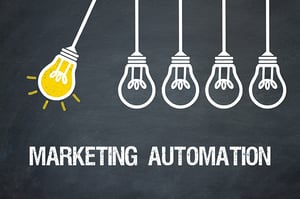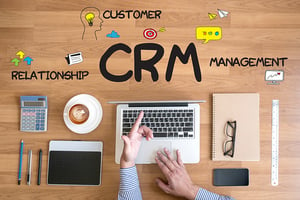A Brief Introduction to Marketing Automation and CRM Software
By: Kim Gomlak, MBA | Vice President, Marketing

Investing in a solution to aid in your law firm’s efforts to market can be a big step. Knowing what to choose from is a good place to start. Before even delving into software-specific research, you should take one step back and consider what types of software are available to you.
At a (very) basic level, there exists marketing automation software and customer relationship management software. There are differences between the two and they will serve different purposes within your organization. In addition, many times they are used by different teams in different capacities.
Marketing Automation Software
 Marketing automation software will help you to streamline your actual marketing processes. As you might expect, this type of software is used primarily by in-house marketing teams. If you’re looking to enhance the promotional emails you send, consolidate your social media presence and posts or create a one-stop-shop for blogging, marketing automation is for you.
Marketing automation software will help you to streamline your actual marketing processes. As you might expect, this type of software is used primarily by in-house marketing teams. If you’re looking to enhance the promotional emails you send, consolidate your social media presence and posts or create a one-stop-shop for blogging, marketing automation is for you.
You may have heard of the “funnel” (or, more recently, the “flywheel”) in terms of the pathway that prospects take when becoming aware of your business and its product or service, and continue on the journey—hopefully—to becoming a client. Marketing automation software should serve to help lead potential customers down that path by providing relevant content to them at the right time in their journey.
As you do so, it’s important to track how effective your efforts are and take note of your potential buyers’ actions. A good marketing automation software will assist you in providing data and feedback, so that you can see what’s resonating with your audience and tailor future initiatives to best fit its needs.
One example of marketing automation software is Hubspot. Hubspot’s software provides one comprehensive platform from which to deploy the vast majority of your marketing efforts.
Hubspot has many convenient features, including (but not limited to):
- The ability to build and deploy emails, either using templates or coding from scratch
- Social media integration so as to manage all your accounts from one central location, along with the ability to post cross-platform at the click of a button
- Blog templates and hosting, to help you disseminate your content quickly and easily
- List segmentation and storage
- Paid advertising management (i.e. Facebook or Google ads)
- User-friendly reporting and campaign management
Another great benefit to exploring all Hubspot has to offer is that there’s a free version available to anyone who’s looking to test the software out before making the leap to purchase a subscription. This allows you to get a feel for how the software may work for your firm, before committing.
It’s worth noting that Hubspot also has a CRM component, available with certain subscription levels, for an even higher level of consolidation and cross-team collaboration.
Other software options similar to Hubspot include:
- Marketo
- Pardot
- Drip
- InfusionSoft
- Ontraport
- …and many, many more
Customer Relationship Management software (“CRM”)
 Used mainly by sales and service teams, customer relationship management software, or CRM software, is used to keep track of, organize and manage interactions with clients and potential customers. Most times, a CRM system is fed new leads when prospects take certain “trigger” actions: whether it be filling out a form on your website, completing an online application, subscribing, etc.
Used mainly by sales and service teams, customer relationship management software, or CRM software, is used to keep track of, organize and manage interactions with clients and potential customers. Most times, a CRM system is fed new leads when prospects take certain “trigger” actions: whether it be filling out a form on your website, completing an online application, subscribing, etc.
One of the biggest benefits to using a CRM is keeping all members of your team informed and on track. By housing all of your customer information in one place, each team member has access to client contact details, interactions logged, tasks and reminders, the source through which they found your firm and so much more. This helps cross-team communication and enhances your clients’ experience. You won’t have to worry about duplicating efforts and any team members can be ready—with the most up-to-date information—to assist a client who contacts you, at any given time.
SalesForce is a well-known example of CRM software. There are different levels of subscription, as with most software platforms, to service companies small to large. You can choose how many licenses you believe you’ll need for your organization.
Some of the features of SalesForce include:
- Customer/account management so all information is housed in one place
- Pipeline creation and reporting and the ability to create custom dashboards for various departments
- Task and activity tracking accessible to all team members using the software
- A robust knowledge base to help you get the most out of your investment
Many times, CRM software will also integrate with certain marketing automation software so if you’re running both concurrently, the two systems can “talk” to each other, feeding information back and forth based on certain parameters that you set up.
Overall, if you haven’t explored some kind of software solution for the management of your marketing activity or customer relationships, now is the time. The time and effort you’ll spend to get up and running will be worth the streamlined process you’ll experience down the road. Marketing automation and CRM software can serve to connect different departments in your organization and securely house your data in a central location, accessible to all who need to be kept informed. Doing your research at the start can help you find the best solution for your company and its needs, so be sure to take advantage of the free trial, customer support and knowledge bases that are readily available to you throughout the process.



